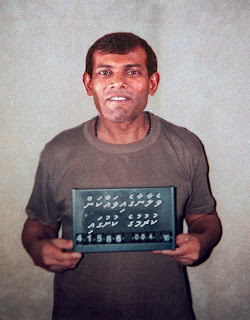
The truth of the matter however is, he was elected as president by the people. How then can his Presidency be anything but a legal? To probe into the case we looked at the Constitution of the Maldives that was ratified in 2008. I reserve judgment, but am posting the relevant pages from the Constitution of Maldives. You decide !!
The Chapter on the Presidency: vis-a-vis "Chapter IV" page 36 and 37 of the Functional Translation of the Constitution of the Republic of Maldives 2008 by Ms. Dheena Hussain LLB.(Hons), (Birmingham), LLM. (London), Barrister-at-Law (Lincoln's Inn)
 You can download these pages and see it more clearly.
You can download these pages and see it more clearly.Now let's look at the actual Dhivehi Version of the Constitution of the Maldives. Again, download the two pages and read it yourself. If you don't read Dhivehi, the English Functional Transation was done at the request of the Ministry of Legal Reform, Information and Art. (This Ministry does not exist anymore, Mr. Nasheed abolished this Ministry and amulgamated the Information and Arts function with the Ministry of Tourism. The Legal Reform? ofcourse he dumped that. He believed that by him being elected as President "Legal Reform " was done. Eh!!

 I don't claim to be the "Expert" in Dhivehi Language, but I sure know my mother tongue, and I know English. Let's say I see my dreams in English. Again "Not the Expert". I have to take my hats off to Ms. Dheena Hussain !!!.. heheh. She has done a marvelous job. It's word to word and the English Functional Translation of the Constitution of Maldives does convey the meaning and spirit of the same written Dhivehi (the Original).
I don't claim to be the "Expert" in Dhivehi Language, but I sure know my mother tongue, and I know English. Let's say I see my dreams in English. Again "Not the Expert". I have to take my hats off to Ms. Dheena Hussain !!!.. heheh. She has done a marvelous job. It's word to word and the English Functional Translation of the Constitution of Maldives does convey the meaning and spirit of the same written Dhivehi (the Original).I asked myself; What about these articles in the Maldivian Constitution, and how could one question the legality of an elected President. hehehe
Here's what happenned. The sooner the New Constitution of 2008 was drafted and ratified, it's fundermentals were compromised in an "One last attempt" to sustain the dictatorship that had lasted for 25 years. His was more of an ego issue than anything else. Here's the truth which Mr. Gayoom (ex-President of Maldives) will swear is a blatent lie.
The New Constitution very clearly states "Any one ever been convicted of an offence for which a Hadd is prescribed in Islam or of fraud, deception or criminal breach of trust should not be accepted to stand for election as President of Maldives"
In the Parliamentary Elections of 2000, Mr. Mohamed Nasheed ran for one of the two seats in the Male Constituency and won one seat. In this election he challenged Mr. Abdulla Kamaaludeen (Maumoon's Man) and Mr. Illyas Ibrahim (Maumoon's Brother-in-Law). AK as he was popularly known, lost to Mr. Nasheed. Nasheed was a Member of the Parliament for Male.
I would be happy to believe that it was a young man in his zeal obviously suffering from an obsessive-compulsive disorder syndrome popularly know as "Kleptomania". But the courts in Maldives sentenced his for theft and robbery. According to Islamic Shariya, Theft and Robbery is an offence for which a Haddh is prescribed.
In liberal Maldives, although the Haddh is not implemented, clearly Mr. Nasheed had committed a offence for which Haddh is prescribed in Islamic Shariyah. Now that according to Chapter IV Article 109 of the Constitution of Maldives is sufficient to disqualify any bid for Presidency of Maladives ever.
How then did Nasheed manage to get himself smuggled through to be the President of Maldives? He didn't. Read about it all in the Part II



 Whoever you talk to, newspaper you read or TV news bulletin, local talk shows you listen to, you don’t escape the word “Corruption” in the Maldives today. Everybody is talking about corruption. It has become the most spoken about subject and mentioned word today. So I ask myself, what the F**k is corruption? Is it become a fashionable word to use in conversation? Does it make your vocabulary sound rich? IDK!!
Whoever you talk to, newspaper you read or TV news bulletin, local talk shows you listen to, you don’t escape the word “Corruption” in the Maldives today. Everybody is talking about corruption. It has become the most spoken about subject and mentioned word today. So I ask myself, what the F**k is corruption? Is it become a fashionable word to use in conversation? Does it make your vocabulary sound rich? IDK!!



